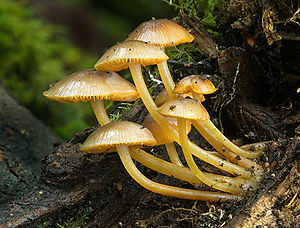Mycology
Mycology is the study of fungi.[1] This includes their genetics, their biochemical properties (the chemical processes in them), their classification, their use to humans and their dangers (poisonous or infectious). Fungi are a source of tinder (easily combustible material to light fires), medicines, food, and psychoactive substances. A biologist who studies mycology is called a mycologist.

Mycology is closely related to phytopathology (the study of plant diseases), because most plant diseases are caused by fungi. Historically, mycology was a branch of botany (plant biology). Now fungi are thought to be more closely related to animals than to plants.
Fungi are fundamental (perhaps essential) for life on Earth. They are symbionts. They can break down complex organic biomolecules, and so they are a link in the global carbon cycle.[2]
Related pages
change- Palynology, the study of tiny natural particles, including fungus spores.
References
change- ↑ Ainsworth, Geoffrey Clough 1976. Introduction to the history of mycology. Cambridge University Press. ISBN 978-0-521-21013-3
- ↑ Kibby, Geoffrey 2017. Mushrooms and toadstools of Britain & Europe. Great Britain ' pp. xiv–xv. ISBN 9780957209428